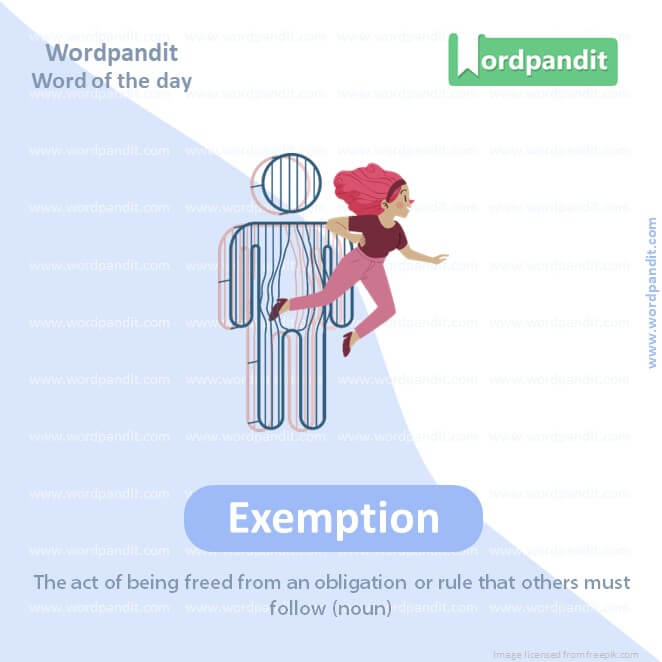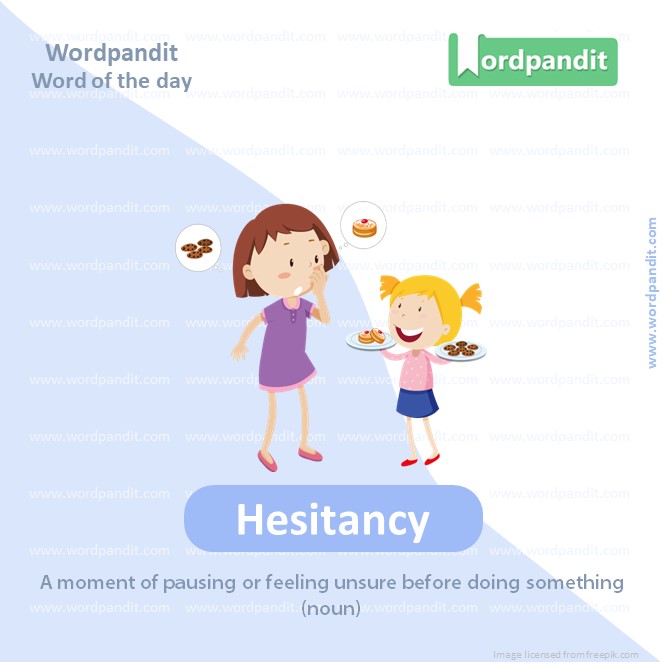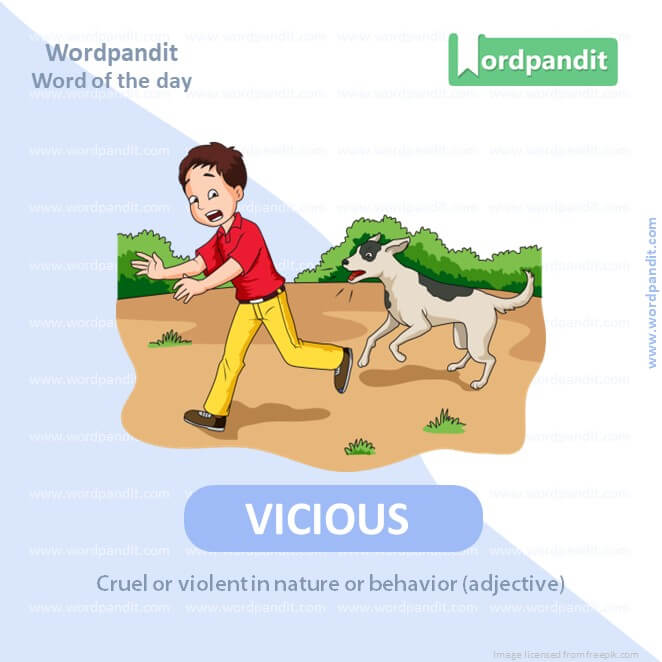Daily Vocabulary Words: List of Daily Used Words in Leading International Newspapers
Hi there. Welcome to this special section @ Wordpandit.
Our endeavour here is very simple: to highlight important daily vocabulary words, which you would come across in leading newspapers in the country. We have included the following newspapers in our selection:
• The New York Times
• The Washington Post
• Scientific American
• BBC
• The Guardian
• Psychology Today
• Wall Street Journal
• The Economist
We are putting in extensive work for developing your vocabulary. All you have got to do is be regular with this section and check out this post on a daily basis. This is your repository of words that are commonly used and essentially, we are posting a list of daily used words. Hence, this has significant practical application as it teaches you words that are used commonly in leading publications mentioned above.
Visit the website daily to learn words from leading international newspapers.

WORD-1: Exemption
CONTEXT: the number of children claiming an exemption to existing mandates has risen much more slowly, to just 2.6 percent that same year.
SOURCE: New York Times
EXPLANATORY PARAGRAPH: Imagine exemption like a special pass that says you don’t have to follow a certain rule. It’s like being excused from doing homework because you helped your friend. That’s an exemption – a little break from the usual rules!
MEANING: The act of being freed from an obligation or rule that others must
follow (noun).
PRONUNCIATION: ig-ZEMP-shun
SYNONYMS: Exception, immunity, release, waiver, privilege, dispensation, freedom.
USAGE EXAMPLES:
1. The teacher granted an exemption to the student who had a valid reason for missing the test.
2. Some people have an exemption from wearing a helmet while biking for medical reasons.
3. The new law provides an exemption for small businesses in certain situations.
4. Emily received an exemption from jury duty due to her recent surgery.

WORD-2: Imperceptible
CONTEXT: Even somewhat imperceptible declines in vaccination coverage can open up once-unthinkable vulnerabilities — and not just for measles.
SOURCE: New York Times
EXPLANATORY PARAGRAPH: Imperceptible is like something so tiny or quiet that you might not even notice it happening. It’s like a little ant moving in the grass – you can’t see it because it’s imperceptible!
MEANING: So small, quiet, or subtle that it’s hard to notice or see (adjective).
PRONUNCIATION: im-per-SEP-tuh-buhl
SYNONYMS: Invisible, unnoticeable, undetectable, minute, tiny, subtle, inconspicuous.
USAGE EXAMPLES:
1. The imperceptible sound of the wind rustling the leaves created a peaceful atmosphere.
2. Jenny’s imperceptible smile revealed her joy at the surprise party.
3. The changes in the painting were so imperceptible that only an artist could notice them.
4. As the sun set, the imperceptible transition from day to night began.

WORD-3: Hesitancy
CONTEXT: Americans often think of vaccine hesitancy as primarily ideological, but demographic, socioeconomic and educational drivers may be even more powerful, and as best we can measure them, the ideological drivers are also moving relatively slowly, too.
SOURCE: New York Times
EXPLANATORY PARAGRAPH: Hesitancy is when you’re not sure and take a moment before doing something. It’s like standing at the edge of a pool, thinking before you decide to jump in – that’s hesitancy!
MEANING: A moment of pausing or feeling unsure before doing something (noun).
PRONUNCIATION: HEZ-i-tun-see
SYNONYMS: Uncertainty, indecision, reluctance, doubt, hesitation, wavering, vacillation.
USAGE EXAMPLES:
1. The speaker’s hesitancy indicated nervousness before the important presentation.
2. His hesitancy to answer the question suggested he didn’t know the answer.
3. The team’s hesitancy in making decisions slowed down the project.
4. Jane’s hesitancy to join the dance reflected her shyness in the spotlight.

WORD-4: Vicious
CONTEXT: the largest outbreaks were in countries most Americans regard as pretty remote (Kazakhstan, Kyrgyzstan and Russia), there is also a vicious surge in Britain.
SOURCE: New York Times
EXPLANATORY PARAGRAPH: Vicious is a strong word that means something really, really bad or harmful. It’s like a mean dog that might hurt you – that’s vicious! It can also mean someone being very mean or doing bad things on purpose.
MEANING: Cruel or violent in nature or behavior (adjective).
PRONUNCIATION: VISH-us
SYNONYMS: Cruel, brutal, savage, aggressive, harmful, malicious, violent.
USAGE EXAMPLES:
1. The storm brought vicious winds that damaged houses and trees.
2. The vicious rumors spread by some students caused a lot of hurt feelings.
3. The dog was usually friendly, but it became vicious when someone approached its food.
4. The villain in the story had a vicious plan to take over the kingdom.

WORD-5: Iteration
CONTEXT: This is all, of course, a new iteration of an old argument. People on both sides seem to be covering the same old song every few years, just with new lyrics.
SOURCE: New York Times
EXPLANATORY PARAGRAPH: Iteration is like doing something over and over again, like singing your favorite song again and again. It’s the repeated action of something you do or say – that’s iteration!
MEANING: The act of repeating a process or action (noun).
PRONUNCIATION: it-uh-RAY-shun
SYNONYMS: Repetition, reiteration, recurrence, redo, repetition, duplication, redoing.
USAGE EXAMPLES:
1. The teacher encouraged the students to practice math problems through iteration.
2. The software developer used iteration to improve the app’s performance.
3. The artist achieved perfection through constant iteration of their painting.
4. Learning a new language requires the iteration of practicing words and phrases.
WORD-6: Rampant
CONTEXT: I knew from my father and his male friends that hostility toward women ran rampant in all-male settings.
SOURCE: New York Times
EXPLANATORY PARAGRAPH: Rampant is like when something spreads everywhere really quickly, like wildflowers growing all over a field. It’s something happening a lot and everywhere – that’s rampant!
MEANING: Widespread and uncontrollable, happening a lot and everywhere (adjective).
PRONUNCIATION: RAM-punt
SYNONYMS: Pervasive, widespread, uncontrolled, widespread, prevalent, epidemic, dominant.
USAGE EXAMPLES:
1. During flu season, illnesses can become rampant, so it’s important to wash hands regularly.
2. The rumors about the surprise party became rampant throughout the school.
3. The invasive species became rampant, affecting the balance of the ecosystem.
4. With the new technology, online shopping became rampant around the world.
WORD-7: Infidelity
CONTEXT: the most common ‘final straw’ reasons were infidelity, domestic violence and substance use.”
SOURCE: New York Times
EXPLANATORY PARAGRAPH: Infidelity is like when someone doesn’t keep a promise to be loyal, especially in relationships. It’s like if you promised to share your candy with a friend but ate it all yourself – that’s infidelity!
MEANING: Not being faithful or breaking promises, especially in a relationship (noun).
PRONUNCIATION: in-fuh-DEL-i-tee
SYNONYMS: Betrayal, unfaithfulness, disloyalty, cheating, deceit, treachery, breach.
USAGE EXAMPLES:
1. The couple struggled to overcome the pain caused by infidelity in their marriage.
2. Trust is essential in friendships, and infidelity can damage that trust.
3. The detective discovered evidence of infidelity during the investigation.
4. The movie portrayed the consequences of infidelity on the characters’ lives.
WORD-8: Cohabitation
CONTEXT: the number of Americans who said that single motherhood and unmarried cohabitation were bad for society increased by several percentage points from 2018 to 2021.
SOURCE: New York Times
EXPLANATORY PARAGRAPH: Cohabitation is like when people decide to live together, like roommates or family members in the same house. It’s a way of sharing the same space and enjoying each other’s company – that’s cohabitation!
MEANING: Living together, sharing the same living space (noun).
PRONUNCIATION: koh-hab-i-TAY-shun
SYNONYMS: Living together, co-residence, cohabiting, sharing a home, residing together.
USAGE EXAMPLES:
1. Many young couples choose cohabitation before getting married to test their compatibility.
2. The cohabitation of various bird species in the same tree created a vibrant ecosystem.
3. The decision to try cohabitation with roommates helped them share expenses and chores.
4. Some people find that cohabitation with pets brings joy and companionship.
WORD-9: Stigmatized
CONTEXT: After World War II, when marriage rates were peaking, divorces were hard to come by and heavily stigmatized, and shotgun marriages were far more common.
SOURCE: New York Times
EXPLANATORY PARAGRAPH: Stigmatized is like when someone is treated differently or looked down upon because of something about them, like wearing glasses. It’s like giving someone a hard time for something they can’t control – that’s being stigmatized!
MEANING: Marked with disgrace or disapproval, treated as less worthy by society (adjective).
PRONUNCIATION: STIG-muh-tized
SYNONYMS: Disgraced, shamed, condemned, marked, criticized, stigmatized, ostracized.
USAGE EXAMPLES:
1. Mental health issues should not be stigmatized; seeking help is a brave choice.
2. The book challenged stereotypes about stigmatized communities and their contributions.
3. Society should work towards inclusivity and not stigmatize individuals based on appearance.
4. The campaign aimed to reduce the stigma associated with stigmatized medical conditions.
WORD-10: Floating
CONTEXT: There’s an idea that’s been floating around for a few years that when it comes to marriage, wealthy elites hold luxury beliefs.
SOURCE: New York Times
EXPLANATORY PARAGRAPH: Floating is like when something is not fixed in one place, like a balloon floating in the air. It’s something that moves gently without a specific destination – that’s floating!
MEANING: Moving or staying on the surface of a liquid without sinking; drifting without a fixed direction (adjective).
PRONUNCIATION: FLOH-tin
SYNONYMS: Drifting, buoyant, suspended, hovering, wafting, levitating, hanging.
USAGE EXAMPLES:
1. The boat had a floating platform that allowed people to swim and relax.
2. Leaves floating on the pond created a picturesque scene in the park.
3. The astronaut experienced a sensation of floating in zero gravity.
4. The artist captured the beauty of a floating feather in their painting.
Vocabulary Words with Meaning
Penetrating the rich tapestry of language, the essence of ‘vocabulary words with meaning’ is a crucial aspect. It’s these seeds of knowledge that bud into fluent conversations and comprehensive understanding. The knack of grasping ‘vocabulary words with meaning’ is pivotal in language learning, but it demands a nuanced approach and strategy.
Learning ‘vocabulary words with meaning’ isn’t about mechanically memorizing heaps of words. It’s about building connections and creating a profound understanding of these words. A promising approach to assimilate ‘vocabulary words with meaning’ involves utilizing a wide range of resources including literature, films, music, and digital content. This immersion provides a broad context and diverse settings for these words, simplifying their comprehension and use.
When you’re focusing on ‘vocabulary words with meaning’, remember to incorporate memory-enhancing techniques into your learning regimen. Tools like flashcards or recall-based applications can aid significantly in long-term retention of these words. Additionally, mnemonic strategies, associating words with distinctive images or stories enhance memory recall and understanding.
The journey of mastering ‘vocabulary words with meaning’ also benefits greatly from practice and application. Engage in conversations using the language, express your thoughts in writing, and try to incorporate newly learned words into your routine. This not only enhances your familiarity with the words but also aids in an intimate understanding of their connotations and denotations.
To sum up, learning ‘vocabulary words with meaning’ is akin to assembling a jigsaw puzzle: it requires patience, strategy, and persistence. But the picture that finally emerges is a beautiful tapestry of language – vivid, articulate, and expressive. So, set your sails toward the voyage of ‘vocabulary words with meaning’, and discover the joy of speaking and understanding a language with finesse.







